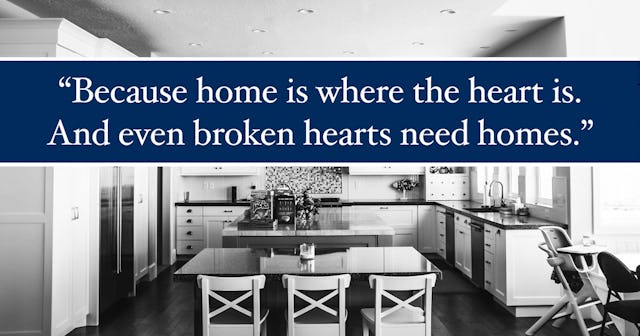We Left Our 'Forever Home' After My Husband Died

We’ve been living in the house—the house that we, my family of three, call the “new house”—for just over a month now. We have a few boxes left to unpack, mostly books and offices supplies, things that are shoved into a drawer or placed on a shelf and mostly forgotten about. We have a decent amount of furniture sitting in the entryway waiting to be donated. There’s simply no room in the new house for those pieces that fit so well in the house that was supposed to be our “forever house”—the house we lived in as a young and innocent family of four.
But most of the boxes, our day-to-day lives, are unpacked. We’ve hung our photos on the walls, which were stark and bare and devoid of warmth when we moved in. We’re grateful we have a house and we’re mostly settled into our routines, into our new normal. And yet…
The other day, my son heard me say something about the forever house and he lit up, his eyes bright and hopeful. He said, “Do we have our home back?” He meant the forever house—the forever house that now belonged to strangers who didn’t know our story, didn’t see the ghost of the lives we’d once lived as a family of four in every room, who maybe didn’t hear the whisper of the word forever the way we did. I had to shake my head and tell him no, watch his smile fade and his shoulders slouch with the heavy weight of disappointment. That home was gone. The “new house” was all we had, and the new house doesn’t feel like home. The new house is simply that—a house, a place where we sleep and sometimes eat, assuming after-school activities leave us time for something more than rushed meals at Chipotle.
I don’t remember it taking this long for the “forever house” to feel like home. In my memory, which is admittedly blurred by time and nostalgia, tainted by grief and heartache, the “forever house” felt like home from the moment the moving trucks pulled into the driveway and I naively announced I was never moving again.
Maybe that’s because then the kids were little and we spent more time in the house—we weren’t running around, rushing from one practice to the next. Maybe because then we were full-steam ahead to start our new lives, and now, we’re more hesitant; we test the ground for sturdiness before we take a tentative step forward. We don’t leap before we look, anymore. Maybe because now our “we” is smaller; our “we” is three instead of “four” and it simply takes more effort to fill a space.
Mary N/Reshot
Or maybe the problem has nothing to do with the new house and everything to do with the broken promise inherent in the word forever, and with the truth that, in this life — this life that has been shattered by cancer, that has listened to a husband take his final breath, that has held grieving children who grappled with the permanence of death — the concept of forever has been demolished, along with the ideas that all stories end in happily ever after and everything happens for a reason.
But if that’s true, if forever no longer exists, then can a house become a home without forever? If home is where the heart is, and the heart is broken, the healing wounds often opening without warning, triggered by grief that blooms when least expected, then is the idea of home broken, too?
I don’t know. I know only that the idea of home is more complicated than it first appears.
On the worst days, when my 40-year-old husband’s brain cancer attacked his ability to think logically, to act rationally, on the days he argued with me that scissors could be used in place of pens to write a note or the days he poured cereal directly on the floor because he forgot to use a bowl, I would often think: I just want to go home. Even though I was home, inside the “forever house” that I never wanted to move away from, I was overwhelmed with the desperate need to just go home.
Because home isn’t always a place. Home is sometimes a person who is standing right in front of you, but who you are already missing because the best parts, the parts that made every inch of your heart swell with love, the parts that made you feel safe, have been stolen. Home is sometimes the echo of long ago laughter from family movie nights you took for granted because you didn’t know that happiness could be fleeting. Home is sometimes so much more than walls and floors, more than a roof and furniture.
Maybe that all means that home is sometimes the joy of recognizing you are exactly where you’re supposed to be, exactly when you’re supposed to be there.
Which is maybe sad, because it means the “new house” won’t feel like home for a while—I don’t know that we, the family of three version of we, are where we’re supposed to be yet. I can’t help but feel as if we have so much further to go, so many more mountains to climb. But also, maybe that’s wildly hopeful, because it means with enough time, enough love and light and hope, we will feel at home again.
I hope so. Because home is where the heart is. And even broken hearts need homes.
This article was originally published on